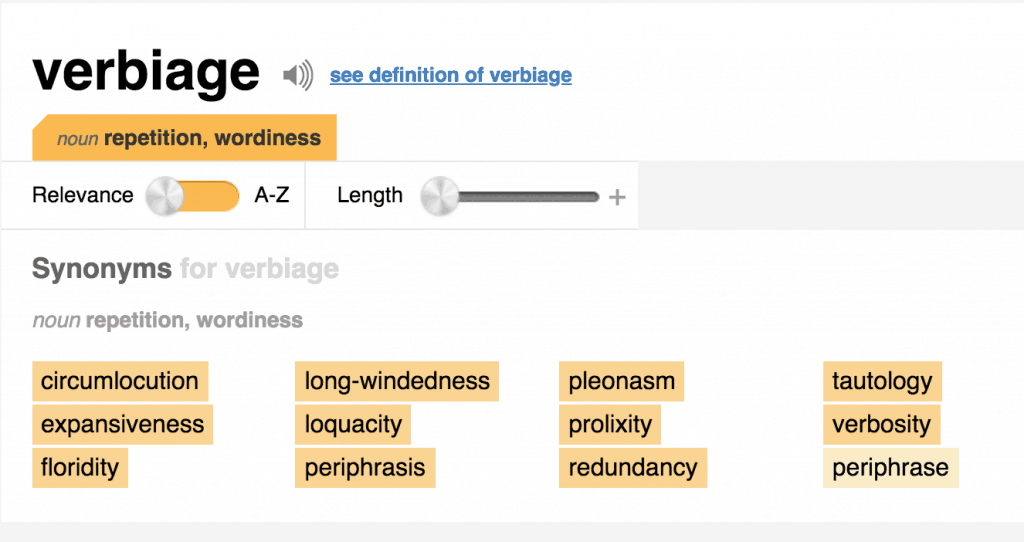There’s a fine line between diction and verbiage. One is choosing the right word for the right moment. The other is stuffing your sentences full of long windy words in the hope you’ll maybe hit on something that works.
We want the first. Not the second. How do you know the difference? Read on for editing guidelines to let you know when you’ve found your best word, the one that makes a sentence sing, and when you need to keep looking.
1. Use the right word without qualifiers
I’m really smart and very very good at knowing what’s going on.
Do you believe me?
Probably not.
“Really” and “very.” Two words that signal you’re not using the best word. Also.. “kind of,” “sort of,” “partially.” You get the idea. If you have to modify the word you’re using with a qualifying adverb to give size and shape to your meaning, it’s not your best choice.
Instead, be precise. Allow your word to carry the size of what you describe. “Very big” translates to huge, enormous, gargantuan. “Really happy” means ecstatic, joyful, thrilled.
Two simple steps to eradicate qualifiers:
1. Do a search for “very” and “really” in your text.
2. When you find one, ask yourself if the word it’s modifying is the one you really mean or do you need to find a better one.
(Hint: You will most likely remove the qualifier or find a better one.)
To find a better one, check out thesaurus.com or Word Hippo.

2. Don’t bloat your words to sound fancy
I just sent you to a thesaurus. Yes, use it, but don’t use words just because they sound big and important. Use the right word at the right time. If “sad” works, there’s no reason to call a thing lugubrious. Sometimes, the straightforward word serves you best.
You know when a word is right because you’ll have a clear sense of the meaning and how it fits in the sentence. The sentence sings with the right word. Use the wrong word simply because you don’t want to use a shorter version, and you’re more likely to use it incorrectly or change your intended meaning or confuse your reader.
There’s a word for people who do this. Sesquipedalian. I have never had another reason to use this word in writing. I probably won’t ever again.
Here’s a great post from Anne R. Allen’s blog talking about the power of the right word along with four tips for strong writing.
You don’t get extra points for big words and more syllables, so when in doubt, say what you have to say cleanly and your readers will thank you.

3. Find the right word by speaking it
Not sure if the word works? Say it out loud. Especially dialogue. I don’t mean just read what you wrote. I mean, put down your pen and paper, hands off the keyboard and just start speaking. Say what you have to say out loud. Experiment with your thesaurus words. Do they sound natural when you say them in human language? Do they flow from your mouth smoothly or do you find yourself tangled in the edges and curves of the words?
When a sentence on paper works, when the words you’ve chosen are doing what they’re supposed to do, they are easy to speak as well.
When to use these hacks
This is the kind of editing you’ll usually approach during the final phases of writing. Once you’ve written your shitty first draft and clarified the structure, then you can go in and shape the language during the editing and polishing stages of writing.
The only exception is Number Three on this list.
Speaking your sentences out loud before writing them down is an excellent exercise to get your words on paper any time. It’ll help you transpose the story running around your brain onto paper. It’ll help you write more realistic dialogue. Say it out loud to break through blocks at any point in the writing process.
When in doubt, it never hurts to write in your own voice. Trust your instinct and write you!

